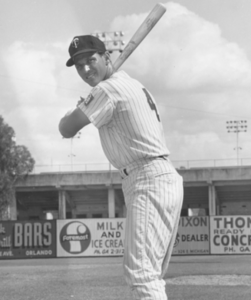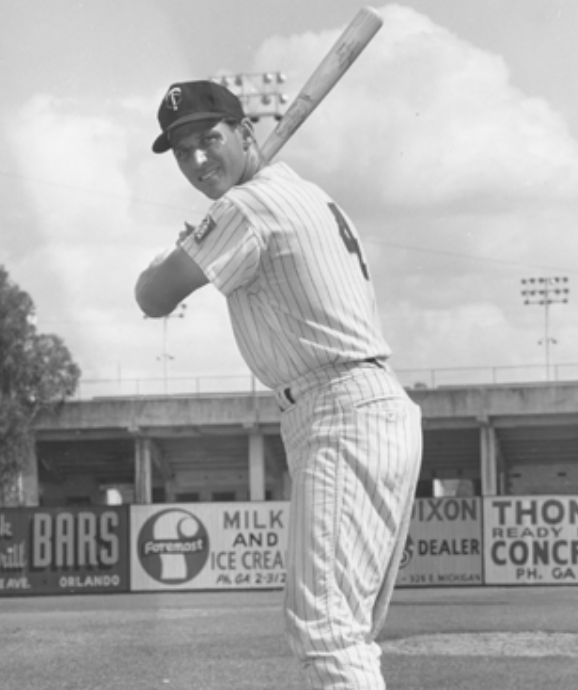April 29, 1970: Stan Williams, Frank Quilici pick off a Twins win versus Cleveland
 Stan Williams, a veteran right-hander, stood atop the mound at Metropolitan Stadium in the top of the ninth inning of a 1-0 game with runners at first and second and two out. At the plate stood pinch-hitter Vada Pinson, a dangerous batter and a new arrival in his first month with the Cleveland Indians after spending 12 seasons in the National League. Pinson was leading his teammates early in the season with a .352 batting average.
Stan Williams, a veteran right-hander, stood atop the mound at Metropolitan Stadium in the top of the ninth inning of a 1-0 game with runners at first and second and two out. At the plate stood pinch-hitter Vada Pinson, a dangerous batter and a new arrival in his first month with the Cleveland Indians after spending 12 seasons in the National League. Pinson was leading his teammates early in the season with a .352 batting average.
Pinson fouled off the first pitch. As Williams circled behind the mound rubbing a new ball, he shouted at second baseman Frank Quilici. “I yelled his name,” Williams said, “and I whistled at him.”
Later, the infielder shared what Williams had to say. “Stan yelled at me to be sure to knock down any groundball that came my way and keep it in front of me,” Quilici said. “It’s something a pitcher always says when the tying or winning run is on second base.”
The pitcher also flashed a sign. “I thought it was the perfect situation to try our pickoff play,” Williams said. “I thought everybody would be thinking about something else after the foul ball.”1
The new ball rubbed and nestled in his glove, Williams looked toward the plate to get the sign from the catcher.
Less than two hours earlier, Jim Kaat threw the opening pitch on a warm Wednesday afternoon in Minneapolis. A strong wind blew in from right field at 24 to 36 miles per hour, the tail end of the previous day’s storm. The wind promised to be a pitcher’s helper, knocking down fly balls hammered to right.
Kaat cruised through the first inning, inducing three groundballs. In the second, he struck out the first two batters he faced, surrendered a double to Ray Fosse, then ended the inning with a third strikeout.
The top of the third inning was notable for three stellar defensive plays. Kaat himself knocked down Jack Heidemann’s smash through the pitching box, pouncing on the slowly rolling ball behind the mound before wheeling to whip a strong underhanded throw to first. On opposing pitcher Rich Hand’s short blooper beyond the infield, Quilici raced with his back to the plate to snag the ball. The inning ended when Quilici dived to grab Ted Uhlaender’s hard drive toward right field, recovering from his dirt-eating snag to make the throw.
“It is just a do-or-die play,” said Quilici, a utility infielder who started only because Rod Carew was nursing a rib injury. “Any time you can knock the ball down at second base you have a chance to throw the runner out.”2
In the bottom of the inning, the Twins managed to score a run against the rookie Cleveland starter. Leo Cardenas singled and was forced at second by Tony Oliva, who then went to second on Harmon Killebrew’s single. Rich Reese’s spinning grounder befuddled Graig Nettles at third base. Oliva managed to race home to score an unearned run on the error. Hand halted the damage by inducing Brant Alyea to hit a routine groundball to second.
Kaat cruised through the fourth with a fly out and a pair of groundouts. In the fifth, Kaat got another groundball out before Fosse singled for his second hit and went to second on Eddie Leon’s single. Heidemann then dropped a hit down the right-field line for Cleveland’s third successive single. Oliva raced toward the line, fielding the ball on the hop before making a strong throw to Paul Ratliff at the plate to cut down Fosse for the inning’s second out, preserving the lead. Fosse went flying in the collision, while Ratliff kept his feet. (Fosse would also be sent flying in a more memorable home-plate collision later in the season. He was infamously knocked down and injured by Pete Rose in the final play of the 1970 All-Star Game.) With runners on first and third, Kaat got yet another infield groundball, as Heidemann was forced, shortstop to second, to end the threat.
In the sixth, Kaat got groundball outs from shortstop to first and first unassisted before Ted Ford singled to left. The inning ended on yet another groundout, third to first.
The gusty wind led to a controversial play in the home half of the sixth. With one out, Reese drove a Hand pitch high and deep to right that seemed likely to go over the fence. Instead, the winds blew the ball back toward the field and Ford made a dive for the ball as it fell to the ground. “I caught it in the webbing,” said Ford,3 who got the start because Pinson was nursing a muscle strain in his leg. The scoreboard operator thought the ball had bounced out of the glove, as did Minnesota’s first-base coach Vern Morgan, but second-base umpire George Maloney, in his sophomore American League season and working his 101st game, ruled the play a catch and Reese out. Morgan and Twins manager Bill Rigney argued their case with predictable results. The umpire told Rigney the ball never left Ford’s glove. Replied Rigney, “Then there’s got to be two of ’em, because I saw one movin’ around out there.”4
Kaat got three more groundouts in the seventh – third to first, short to first, third to first. He also had a one-two-three eighth with a flyout to right, a groundout third to first, and a called strike three on Uhlaender.
For the ninth, Rigney replaced Killebrew, who had six assists at third on the day, with Minnie Mendoza, a Cuban known for his fielding. Kaat was within an out of victory after getting Nettles to fly to center and striking out Ford. But then Tony Horton slashed a double to left and Roy Foster walked. Rigney dismissed Kaat in favor of the 6-foot-5, 230-pound Williams, the former Cleveland hurler, who was 2-0 and had yet to give up an earned run over 8⅔ innings in seven appearances.
Meanwhile, Cleveland manager Alvin Dark replaced Fosse with Pinson, who fouled off the reliever’s first pitch.
As Williams prepared to throw his second pitch, Horton took a lead off second as Quilici snuck to the base. Williams spun, throwing to second as a desperate Horton dived for the bag. Umpire Maloney raised a right fist, ending the game.
“I tagged his hand,” Quilici said. “I thought it was close enough to be called either way. It was just boom-boom that fast and just one of those things.”5
Horton, who insisted the tag got him on the bicep, not the hand, rose from the dirt to argue with the umpire, who once again rejected the appeal on his original verdict.
“I didn’t think I was out,” Horton said. “I wouldn’t have argued so much if I thought I was. It was a close play and it was my fault for making it so close.”6
Cleveland’s manager was forgiving in the wake of losing a 1-0 road game on a pickoff play. “This club is going to beat a lot of teams this season,” Dark said. “Sure, they’re going to make mistakes – a good player makes mistakes because he’s trying to win any way he can. But you’ve got to go along with them when they hustle and that’s what they’re doing.”7
It was a tough loss for the rookie Hand, who took his third defeat against no wins despite giving up just six hits and one walk over seven innings.
“I lost, so I didn’t pitch well enough to win,” Hand said. “That’s life. The first win is always the toughest.”8 (The rookie would not get his first win until June 7, on a day he gave up three home runs, as Cleveland defeated the California Angels 6-4 in Anaheim.)
The game, which lasted 1 hour, 58 minutes, was seen by just 4,241 fans, among them Jackie Dark, the Cleveland manager’s new bride, who spent her honeymoon touring American League cities. Wearing a floppy white hat, she sat in a box seat at Metropolitan Stadium alongside Cleveland owner Vern Stouffer and club President Gabe Paul.
After the game, Quilici explained his role on the Twins, where he was accustomed to giving Killebrew a late-inning respite at third. “You have to be a different breed to be a utilityman,” he said. “You can’t show you are envious of anyone, or say, ‘Hey, I can do it better.’ It happens to be a job I enjoy. I get the same satisfaction a coach gets when he watches his players execute well.”9
Minnesota’s manager had nothing but praise for his utilityman. “That Italian fellow may not have all the ability in the world, but he sure is inside the game all the time,” Rigney said. “He’s been making the double play for us and today he makes two super plays. He might make a good manager for somebody.”10
Rigney added Quilici to his coaching staff the following season. After Rigney was fired midway through the 1972 season, Quilici, 33, was promoted to manager. Quilici had a 280-287 record as Twins manager before being replaced in 1975 by Gene Mauch. He was later a commentator on Twins radio broadcasts.
The 1-0 victory improved Kaat’s record to 3-1. He gave up six hits, walked one, and struck out five. He limited Cleveland batters to just three fly-ball outs, while inducing 16 groundball outs.
“The only time I was in real trouble was when Oliva made that throw to home,” Kaat said. “But anytime you’re in a 1-0 game, you’re in serious trouble as long as you’re on the mound.”11
In the Minnesota clubhouse, outfielder Bob Allison and pitcher Dave Boswell teased reporters for ignoring the starting pitcher in favor of talking to the reliever.
“Over here,” Allison called out to the reporters. “This guy,” he said, pointing to Kaat, “threw more than 100 pitches. He [indicating Williams] threw just one.”
The reliever wished to correct the record.
“I threw two strikes,” Williams insisted. “One each way.”12
Sources
retrosheet.org/boxesetc/1970/B04290MIN1970.htm
baseball-reference.com/boxes/MIN/MIN197004290.shtml
Briere, Tom. “Mgr. Dark’s Mgr. Is a Baseball Fan,” Minneapolis Tribune, April 30, 1970: 30.
“Frank Quilici, Former Twins Player, Manager, Broadcaster, Dead at 79,” Minneapolis Star-Tribune, May 16, 2018, startribune.com/frank-quilici-former-twins-player-manager-broadcaster-dead-at-79/482616621, accessed December 14, 2019.
Notes
1 Jon Roe, “Twins’ Kaat, Williams Halt Indians 1-0,” Minneapolis Tribune, April 30, 1970: 29.
2 Mike Lamey, “‘Caddy’ Quilici Star Again,’” Minneapolis Star, April 30, 1970: 53.
3 Sheldon Ocker, “3 Glaring Mistakes Cost Tribe,” Akron (Ohio) Beacon Journal, April 30, 1970: 56.
4 Ocker.
5 Ocker.
6 Ocker.
7 Ocker.
8 Ocker.
9 Lamey.
10 Roe.
11 United Press International, “Kaat Stops Indians 1-0,” St. Cloud (Minnesota) Times, April 30, 1970: 28.
12 “Williams Pitched One Ball but ‘Two Strikes,’” Minneapolis Star, April 30, 1970: 57.
Additional Stats
Minnesota Twins 1
Cleveland Indians 0
Metropolitan Stadium
Bloomington, MN
Box Score + PBP:
Corrections? Additions?
If you can help us improve this game story, contact us.


